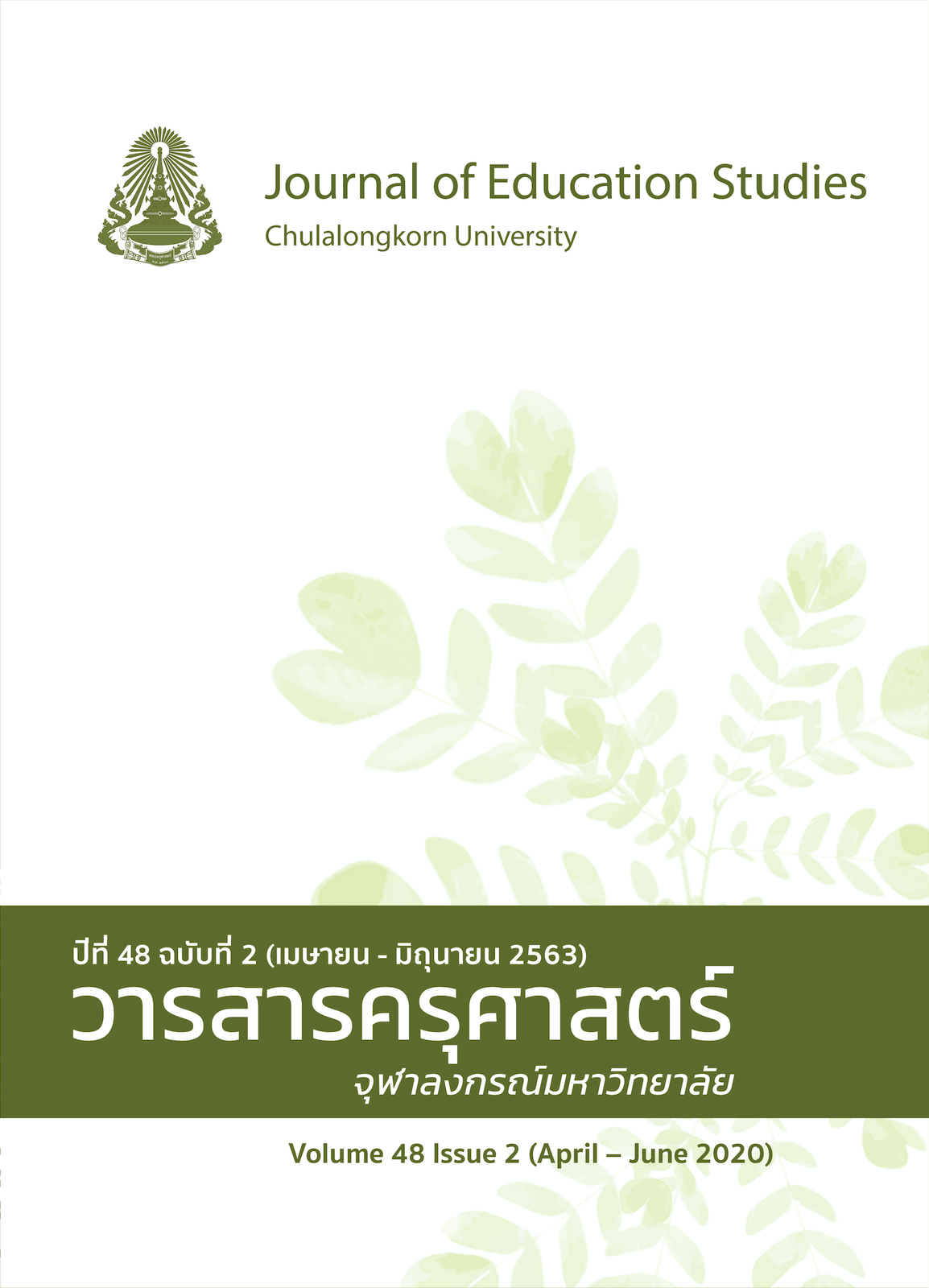University Library Management Strategies to Enhance Lifelong Learning Skills of Students
DOI:
https://doi.org/10.14456/educu.2020.57Keywords:
management strategies, university library management, lifelong learning skills, undergraduate studentsAbstract
The purpose of this research was to develop university library management strategies to enhance lifelong learning skills of students. This study was conducted using a mixed method approach. The samples of the study were 97 state and private university libraries. A questionnaire and a strategic evaluation form of feasibility and appropriateness were used as tools to collect data. Frequency, percentage, mean, standard deviation, PNI modified and f-test were used to analyze the collected data.
The research findings showed that the five main strategies of university library management to enhance lifelong learning skills of students are 1) Library development strategies for lifelong learning resources in the digital age; 2) Intellectual repository use promotion strategies for lifelong learning of students; 3) Innovative digital information literacy teaching strategies for support of lifelong learning of students; 4) Environment management strategies for lifelong learning, and 5) Competency development strategies in lifelong learning for information professionals.
References
ครรชิต มาลัยวงศ์. (2542, 24 กันยายน). การพัฒนาการเรียนรู้ตลอดชีวิต. www.drkanchit.com/ict_ideas/articles/lifelearn.pdf
จันทรรัตน สิทธิสมจินต์, สุดใจ ธนไพศาล, กนกอร สมปราชญ์, และ สุรวีร์ รุ่งเรือง. (2557). กลยุทธ์การบริหารงานห้องสมุดมหาวิทยาลัยสู่องค์การสมรรถนะสูง: กรณีศึกษาห้องสมุดมหาวิทยาลัยขอนแก่น. วารสารห้องสมุด, 58(1), 1-13.
เฉลิม วราวิทย์ และ ไพฑูรย์ สินลารัตน์. (ม.ป.ป.). ทักษะ 7 ประการ ในการเกื้อหนุนการเรียนรู้. www.km.thaicyberu.go.th/linkfile/Books/Book5.pdf
ทบวงมหาวิทยาลัย. (2544). ประกาศทบวงมหาวิทยาลัย เรื่อง มาตรฐานห้องสมุดสถาบันอุดมศึกษา พ.ศ.2544. ทบวงมหาวิทยาลัย.
ปิยสุดา ตันเลิศ และ กุลธิดา ท้วมสุข. (2554). บทบาทของห้องสมุดและนักวิชาชีพสารสนเทศสำหรับห้องสมุด สถาบันอุดมศึกษาไทย พ.ศ. 2553-2562. วารสารสงขลานครินทร์ ฉบับสังคมศาสตร์และมนุษยศาสตร์, 17(4), 608-623.
วิจิตร ศรีสอ้าน. (2545). การเรียนรู้ตลอดชีวิต (Lifelong education). วารสารสออ.ประเทศไทย, 5(1), 12-18.
สมาคมห้องสมุดแห่งประเทศไทย. (2555). ก้าวใหม่ของห้องสมุด (Libraries on the move): การประชุมใหญ่สามัญประจำปี 2554 และประชุมวิชาการ สมาคมห้องสมุดแห่งประเทศไทย วันที่ 28-30 มีนาคม 2555 ณ โรงแรมอะเดรียติคพาเลซ กรุงเทพมหานคร. สมาคมห้องสมุดแห่งประเทศไทย.
สำนักงานคณะกรรมการการศึกษาแห่งชาติ. (2543). รายงานสรุปการสัมมนายุทธศาสตร์การเรียนรู้ตลอดชีวิต. สืบค้นจาก http://202.143.150.11/media/ebook/pdf/4318005/pdf.pdf.
สำนักงานเลขาธิการสภาการศึกษา. (ม.ป.ป.). กรอบและทิศทางการวิจัยทางการศึกษาของประเทศ (พ.ศ. 2555-2558) เพื่อสนับสนุนการดำเนินงานตามนโยบายด้านการศึกษาของรัฐบาล. กรุงเทพฯ : สำนักงานเลขาธิการสภาการศึกษา.
สำนักงานเลขาธิการสภาการศึกษา. (2552). ข้อเสนอการปฏิรูปการศึกษาในทศวรรษที่สอง (พ.ศ.2552-2561). กรุงเทพฯ : สำนักงานเลขาธิการสภาการศึกษา.
สำนักทรัพยากรการเรียนรู้คุณหญิงหลง อรรถกระวีสุนทร มหาวิทยาลัยสงขลานครินทร์. (2554). พันธกิจ. http://www.clib.psu.ac.th/home/index.php?option=com_content&view=article&id=1808&Itemid=303&lang=th.
สำนักหอสมุดกลาง มหาวิทยาลัยศรีนครินทรวิโรฒ. (2555). พันธกิจ. http://lib.swu.ac.th/th/index.php?option=com_content&view=article&id=278&Itemid=90.
สำนักหอสมุด มหาวิทยาลัยรังสิต. (2556). วิสัยทัศน์/ พันธกิจ. http://library.rsu.ac.th/library_vision.html.
สุมาลี สังข์ศรี. (2543). รายงานสรุปการสัมมนานโยบายส่งเสริมการศึกษาตลอดชีวิตของประเทศไทย. สถาบันเทคโนโลยีการศึกษาแห่งชาติ สำนักงานคณะกรรมการการศึกษาแห่งชาติ.
สุมาลี สังข์ศรี. (2544). รายงานการวิจัย การศึกษาตลอดชีวิตเพื่อสังคมไทยในศตวรรษที่ 21. สถาบันเทคโนโลยีการศึกษาแห่งชาติ สำนักงานคณะกรรมการการศึกษาแห่งชาติ.
สุวิมล ว่องวาณิช. (2558). การวิจัยประเมินความต้องการจำเป็น (พิมพ์ครั้งที่ 3 ฉบับปรับปรุง). สำนักพิมพ์แห่งจุฬาลงกรณ์มหาวิทยาลัย.
อนุรักษ์ อยู่วัง. (2555). การจัดการคลังสถาบันในห้องสมุดมหาวิทยาลัย [วิทยานิพนธ์ปริญญามหาบัณฑิต, จุฬาลงกรณ์มหาวิทยาลัย]. CUIR. http://cuir.car.chula.ac.th/handle/123456789/45085
ภาษาอังกฤษ
Adams, D. (2007). Lifelong learning skills and attributes: The perceptions of Australian secondary school teachers. Issues in Educational Research, 17(2), 149-160.
Bangert, S. R. (1997). Values in college and university library mission statements: A search for distinctive beliefs, meaning, and organizational culture. Advances in Librarianship, 21, 91-106.
Collins, J. (2009). Lifelong learning in the 21st century and beyond. RadioGraphics, 29(2), 613-622. https://doi.org/10.1148/rg.292085179
Cotton, K. (1998). From high school student to lifelong learner [microform]: Your route to independence. Research you can use: Lifelong learning series, booklet 4 / Kathleen cotton. https://files.eric.ed.gov/fulltext/ED422607.pdf
Dong, W. (2004). Improving students’ lifelong learning skills in Circuit Analysis. The China Papers, 4, 75-78.
European Commission. (2000). Commission staff working paper: A memorandum on lifelong learning. www.seeeducoop.net/education_in/pdf/lifelong-oth-enl-t02.pdf
European Commission. (2002). European report on quality indicators of lifelong learning: Fifteen quality indicators. http://ec.europa.eu/education/lifelonglearningpolicy/doc/policy/qualityreport_en.pdf
Hainuat, L. D. (1981). “Educational needs” in UNESCO curricula and lifelong education: Education on the move. Imprimeries de Chambery.
Hanewald, R. (2012). Cultivating life-long learning skills in undergraduate students through the collaborative creation of digital knowledge maps. Procedia-Social and Behavioral Sciences, 69, 847-853.
Knapper, C. (2006). Lifelong learning means effective and sustainable learning reasons, ideas, concrete measures. http://www.ciea.ch/documents/s06_ref_knapper_e.pdf
Kwon, S. Y., & Cifuentes, L. (2009). The comparative effect of individually-constructed vs. collaboratively-constructed computer-based concept maps. Computers & Education, 52(2), 365-375.
Lewis, D. W. (2007). A strategy for academic libraries in the first quarter of the 21st century. College & Research Libraries, 68(5), 418-434.
Lublin, J. (2003). Lifelong learning and self-directed learning. http://api.ning.com/files/FrxSDD3tZkm6es*Chd5gYuGYpKgwzaUodu0ReLV6Dew5NNOTGNqc
iv3dAtuRbUUo8KN9EFQUcRCWk8U6JPzOs2w2Nxda71s0/lifeLongLearning.pdf
Newby, T., Stepich, D., Lehman, J., & Russell, J. (2000). Instructional technology for teaching and learning: Designing instruction, integrating computers, and using media (2nd ed.). Prentice Hall.
Nordstrom, N. M. (2011). Top 10 benefits of lifelong learning. http://www.selfgrowth.com/articles/Top_10Benefits_of_Lifelong_Learning.html
Smith, J., & Spurling, A. (1999). Lifelong learning riding the tiger. Cassell.
Tanloet, P., & Tuamsuk, K. (2011). Core competencies for information professionals of Thai academic libraries in the next decade (A.D. 2010–2019). The International Information & Library Review, 43(3), 122-129. http://dx.doi.org/10.1016/j.iilr.2011.07.005
Tuamsuk, K., Kwiecien, K., & Sarawanawong, J. (2013). A university library management model for students' learning support. The International Information & Library Review, 45(3–4), 94-107. http://dx.doi.org/10.1016/j.iilr.2013.10.002
Downloads
Published
How to Cite
Issue
Section
License

This work is licensed under a Creative Commons Attribution-NonCommercial-NoDerivatives 4.0 International License.




